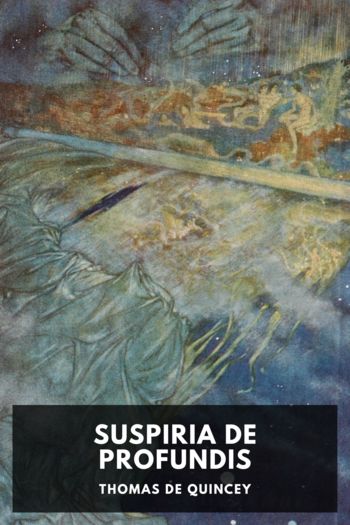Suspiria de Profundis by Thomas De Quincey (urban books to read .TXT) 📕

- Author: Thomas De Quincey
Book online «Suspiria de Profundis by Thomas De Quincey (urban books to read .TXT) 📕». Author Thomas De Quincey
On this occasion the usual silence and solitude prevailed along the road. Not a hoof nor a wheel was to be heard. And, to strengthen this false luxurious confidence in the noiseless roads, it happened also that the night was one of peculiar solemnity and peace. For my own part, though slightly alive to the possibilities of peril, I had so far yielded to the influence of the mighty calm as to sink into a profound reverie. The month was August; in the middle of which lay my own birthday—a festival to every thoughtful man suggesting solemn and often sigh-born37 thoughts. The county was my own native county—upon which, in its southern section, more than upon any equal area known to man past or present, had descended the original curse of labour in its heaviest form, not mastering the bodies only of men, as of slaves, or criminals in mines, but working through the fiery will. Upon no equal space of earth was, or ever had been, the same energy of human power put forth daily. At this particular season also of the assizes, that dreadful hurricane of flight and pursuit, as it might have seemed to a stranger, which swept to and from Lancaster all day long, hunting the county up and down, and regularly subsiding back into silence about sunset, could not fail (when united with this permanent distinction of Lancashire as the very metropolis and citadel of labour) to point the thoughts pathetically upon that counter-vision of rest, of saintly repose from strife and sorrow, towards which, as to their secret haven, the profounder aspirations of man’s heart are in solitude continually travelling. Obliquely upon our left we were nearing the sea; which also must, under the present circumstances, be repeating the general state of halcyon repose. The sea, the atmosphere, the light, bore each an orchestral part in this universal lull. Moonlight and the first timid tremblings of the dawn were by this time blending; and the blendings were brought into a still more exquisite state of unity by a slight silvery mist, motionless and dreamy, that covered the woods and fields, but with a veil of equable transparency. Except the feet of our own horses—which, running on a sandy margin of the road, made but little disturbance—there was no sound abroad. In the clouds and on the Earth prevailed the same majestic peace; and, in spite of all that the villain of a schoolmaster has done for the ruin of our sublimer thoughts, which are the thoughts of our infancy, we still believe in no such nonsense as a limited atmosphere. Whatever we may swear with our false feigning lips, in our faithful hearts we still believe, and must forever believe, in fields of air traversing the total gulf between Earth and the central heavens. Still, in the confidence of children that tread without fear every chamber in their father’s house, and to whom no door is closed, we, in that Sabbatic vision which sometimes is revealed for an hour upon nights like this, ascend with easy steps from the sorrow-stricken fields of earth upwards to the sandals of God.
Suddenly, from thoughts like these I was awakened to a sullen sound, as of some motion on the distant road. It stole upon the air for a moment; I listened in awe; but then it died away. Once roused, however, I could not but observe with alarm the quickened motion of our horses. Ten years’ experience had made my eye learned in the valuing of motion; and I saw that we were now running thirteen miles an hour. I pretend to no presence of mind. On the contrary, my fear is that I am miserably and shamefully deficient in that quality as regards action. The palsy of doubt and distraction hangs like some guilty weight of dark unfathomed remembrances upon my energies when the signal is flying for action. But, on the other hand, this accursed gift I have, as regards thought, that in the first step towards the possibility of a misfortune I see its total evolution; in the radix of the series I see too certainly and too instantly its entire expansion; in the first syllable of the dreadful sentence I read already the last. It was not that I feared for ourselves. Us our bulk and impetus charmed against peril in any collision. And I had ridden through too many hundreds of perils that were frightful to approach, that were matter of laughter to look back upon, the first face of which was horror, the parting face a jest—for any anxiety to rest upon our interests. The mail was not built, I felt assured, nor bespoke, that could betray me who trusted to its protection. But any carriage that we could meet would be frail and light in comparison of ourselves. And I remarked this ominous accident of our situation—we were on the wrong side of the road. But then, it may be said, the other party, if other there was, might also be on





Comments (0)